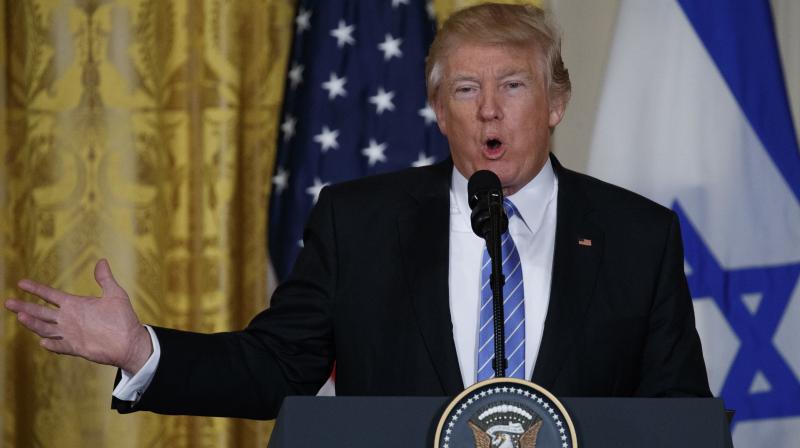Trump's solution': Will Middle East explode?

US President Donald Trump has given burial rights to a two-state solution, ending the decades-long policy of US administrations and the world by giving Palestinians their defanged nation living alongside a Jewish entity. Hosting Israel's Prime Minister Benjamin Netanyahu at the White House, he said a two-state or one-state solution was all right with him as long as the two immediate parties agreed. Mr Trump had boasted during his election campaign that he would resolve the most contentious Middle East issue where others had failed. The first inkling of what it would be emerged at the White House press conference, with the US President opting for a regional solution on the strength of major Sunni states teaming up with Israel to fight the common enemy, Iran. The only mild admonition he had for Israel was "to hold back a little bit" on settlement building. Palestinians had little chance to achieve a state of their own after the disastrous 1967 war, with Israel occupying more and more Palestinian land. Occupied East Jerusalem has been annexed and the spree in settlement building, reignited by the Trump victory, made a Palestinian entity increasingly remote. As Israel's coalition swung right, Mr Netanyahu was happy to bask in the glory of a single Jewish state.
Israel has been the most coddled nation state in American political history. Over a succession of US administrations, Washington winked at Israel building a nuclear arsenal while Tel Aviv was the recipient of the most generous economic and military assistance. And the American Jewish lobby took over political Washington by intimidating US legislators to vote for Israel by pulling their financial support. And the world deferred to American primacy in resolving he problem. In the long history of the Israeli-Palestinian conflict, there have been many false starts, including the Oslo accords. Along the way, more and more Israelis came round to the view that, given the near-absolute American support, they could get away without giving anything to Palestinians. Now with a friendly US President in office, they are blowing the victory bugle. President Trump is delaying moving the US embassy from Tel Aviv to Jerusalem, as he had promised during the campaign. But the whole pitch of the new administration is to make Israel strong. Although he has appealed to Israelis to show flexibility, his efforts seem directed at Sunni Gulf kingdoms to do the dirty job of Israel ruling Palestinians as a subject race in a Jewish state.
What are the chances of Mr Trump succeeding where others have failed? It is true that an increasing number of Arab states have informal relations with Israel, but for them to repudiate their fellow Palestinians' cause is a step too far, even taking into account the animosity towards Iran they share. Both Mr Trump and Mr Netanyahu agree that it was a bad agreement the Obama administration and other world powers signed with Tehran on curbing its nuclear programme. But repudiating it is another matter, given other countries' stakes. Will Palestinians meet the fate of the Kurds spread over many countries, fighting the Turkish state as guerrillas and in Syria fighting with Americans against the Islamic State? It seems unlikely because the Palestinian cause has a resonance across the wider Arab and developing world. It was Yasser Arafat who brought romance to his quest for an independent Palestine. Jews, who evoke the Holocaust at the slightest provocation, seem happy to suppress Palestinians by occupying and building on their land and finally pronouncing it all belongs to it because of ancient history. Imagine what the world would look like if countries made their claims based on centuries of history!
The joint aim of Mr Trump and Mr Netanyahu is to make Iran the bad boy of the region and get the region's Arab states to team up with Israel. It is an idea divorced from reality. Making furtive contacts with Israel is one thing, to be seen supping with the devil quite another. If such an unlikely outcome would come to pass, the main beneficiary would be the so-called Islamic State or ISIS, who would paint the Gulf's rulers in lurid colours. Indeed, it is revealing that Mr Trump' son-in-law, Jared Kushner, has been made the overseer of the Israel-Palestinian problem. Indeed, it seems unlikely that Shia Iran will not merely become a unifying factor for the Sunni Gulf states but will compel the latter to forsake their brother Palestinians to make public cause with Israel. As the short tempestuous error-prone Trump administration has shown thus far, the new ruler in Washington is fumbling for a solution without a clear idea of what would follow.
Palestinians themselves have a lot to answer for Mr Arafat himself had made mistakes in not seizing the right moment, his vanity often standing in the way. Mr Mahmoud Abbas is way beyond his allotted time as the head of the Palestinian movement, which is in any event split down the middle, with a separate set of Palestinians in the form of Hamas ruling the Gaza Strip after a fashion. Right-wing Israelis might believe that they have won a famous victory, with a friendly President in the White House and Palestinians running from pillar to post. Mr Netanyahu's demand is that Palestinians recognise the Jewish nature of the Israeli state. And they shall be ruled as a subject race till eternity. In the real world, such a happy ending for the Israeli state would be a fairytale. Mr Trump's consistent theme has been the destruction of the Islamic State. By his loud open support for Israel's illegal ambitions, he is merely giving succour to his proclaimed enemies. Beyond the expected Palestinian reaction, there is perhaps an undercurrent of hope that by overplaying his hand, Mr Trump has heightened the stark injustice of subjecting the inhabitants of the land Israel occupies to a subject status. Despite underhand dealings, which Arab ruler can live with this ignominy?

